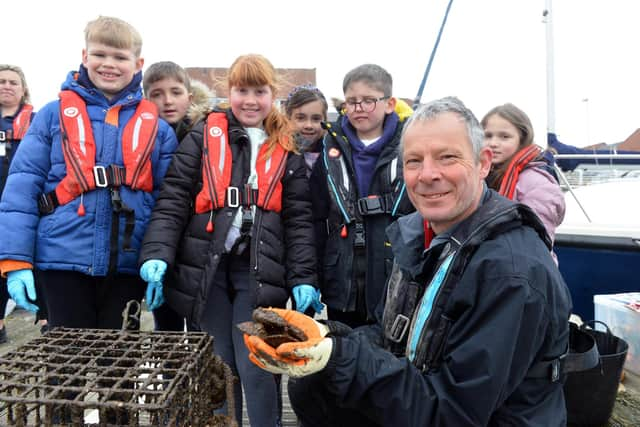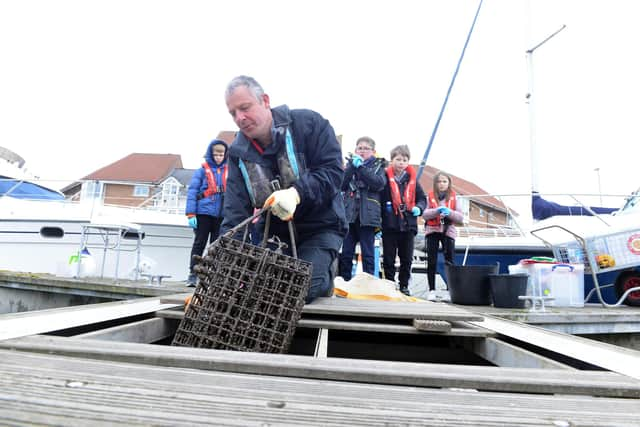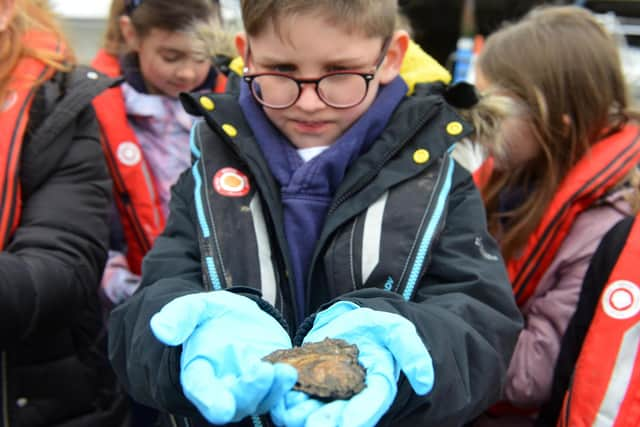Sunderland pupils support Wild Oyster Project to improve water quality and create reef to protect against future storm damage
and live on Freeview channel 276
The Wild Oysters Project is hoping to reverse the damage caused by decades of dredge-fishing and over-harvesting which has seen a 95 per cent reduction in oyster populations in UK waters, including the North Sea.
Led by the Zoological Society of London, Blue Marine Foundation and British Marine, three key locations have been identified to reintroduce oysters in a bid to restore natural populations.
Advertisement
Hide AdAdvertisement
Hide AdWith Tyne and Wear identified as a “key area”, Sunderland Marina is one of six locations where 30 oyster farms are being cultivated.
By April 2023, the project plans to install a 2.5km square offshore reef consisting of 150 tonnes of used scallop shells and larvae from the nurseries will be used to “create a self-sustaining population of oysters”.
With plans to create further reefs, the project could improve water-quality and biodiversity and increase protection from storm-surges.
The initiative is facilitated by the community charity Groundwork and local project lead and Wildlife Biologist Stephen Brend said: “Forget about coral reefs, shellfish reefs are the most badly damaged marine habitat and as a result, oyster populations in the North Sea have almost disappeared.


Advertisement
Hide AdAdvertisement
Hide Ad"While oysters may look like rocks, they’re fascinating creatures which have a massive impact on the environment. One oyster can filter 200 litres of water a day and so large populations can have a massive impact on improving water-quality.
"They filter and digest things like algae and all the nitrates we get entering our seas from run-off from farming practices. It’s the sea’s natural way of keeping water clean.
"Dredging can also leave the seabed very flat, where as a reef with the oysters provides an uneven surface which provides protection for smaller fish which can increase biodiversity.
"Reefs out at sea also provide a natural buffer with the land which can reduce the potential for damage caused by the sea during all the recent storms we’ve been having.”


Advertisement
Hide AdAdvertisement
Hide AdA key focus of the project is to educate about the importance of oyster populations and the wider implications of damaging marine ecosystems.
To help achieve this goal, the project has enlisted local schoolchildren to help monitor the oyster nurseries by counting and weighing numbers of the species in the marina while also learning about the biodiversity of the marine environment.
One of those schools keen to be involved was Seaburn Dene Primary School.


Year 4 teacher Richard Good said: “Groundwork came into school to deliver a workshop about the project, and before coming down to the marina, children have been learning all about the crucial role oysters play in improving things like water-quality.
Advertisement
Hide AdAdvertisement
Hide Ad"It’s really important children learn about the environment on their doorstep and the long-term benefits of conserving it for their future.”
The project certainly seems to have had the desired effect on the children.
Matilda Marrs, nine, said: “I hope in years to come we can have an oyster population in the North Sea. Oysters are really important in keeping the sea clean.”
Max Boydell, nine, added: “It’s important to protect our environment and I’ve really enjoyed helping count and weigh the oysters in the nursery.”
Comment Guidelines
National World encourages reader discussion on our stories. User feedback, insights and back-and-forth exchanges add a rich layer of context to reporting. Please review our Community Guidelines before commenting.
